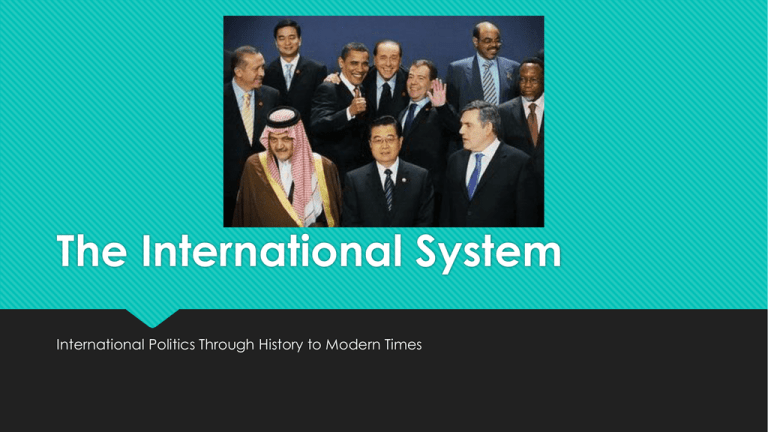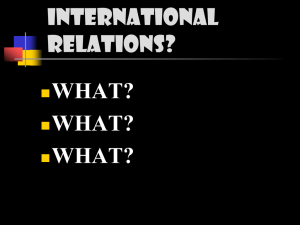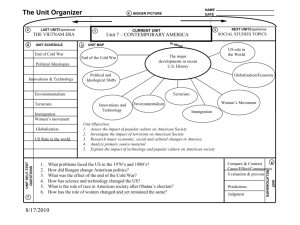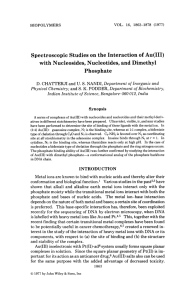The International System
advertisement

The International System International Politics Through History to Modern Times What is it? Nations interacting with one another on the global stage. Each nation is considered to be sovereign (free) but some are more powerful than others. Evolution of the Modern International System The modern international system is only a few centuries old. 4 key events/phases define its’ evolution. 1. The Peace of Westphalia (1648) 2. Shifting Balance of Power (1600 to 1800) 3. Rise of Nationalism (1800 to 1945) 4. New World Orders (1945 to Present) The Peace of Westphalia (1648) Treaty that ended the Thirty Years’ War in Central Europe between Catholics and Protestants. It declared that each nation could do as he or she wished within their borders. Established states speaking for themselves and being independent of influences. Shifting Balance of Power (1600 to 1800) Some states in Europe throughout this period became extremely powerful and smaller states would ban together to balance out the power. Example: Napoleon and France vs. Great Britain, Austria, and Russia Rise of Nationalism (1800 to 1945) Nationalism or the belief your nation is superior emerged as a popular idea in the 1800s. It allowed new nations such as Italy and Germany to emerge and also created a sense of competition like never before between nations. New World Orders (1945 to Present) Following WWII only two great powers remained, the United States and the Soviet Union. After the fall of the Soviet Union, we are now in a new era with only the U.S. as a superpower and multiple emerging super powers. The Modern Political System Today, in addition to nations interacting with one another, interest groups, corporations, institutions, and activists all play a role in international politics. The result is a constantly shifting and evolving political stage. Theories of International Relations Some major theories have developed to explain how nations interact with one another. 1. Realism 2. Liberalism 3. Idealism Realism Believes that nation work only to increase their own power relative to that of other states. In other words, realists believe that essentially nations are simply looking out for themselves and that in order to survive, a nation must be strong. Realist Thinker: Machiavelli Machiavelli was an Italian Philosopher in the 1500s that believed effective leaders and nations use deceit and violence as tools against other states. He believed you had to be brutal at times to succeed and deal with conflicts decisively. Liberalism Emphasizes that connections among nations make it difficult for nations to make decisions that do not effect other nations. The belief is that there are consequences to nations acting alone and not with regard for others. Idealism Believes that nations should pursue moral goals and act ethically in international politics. They oppose the use of deception and violence in politics. International Agreements and Laws In order to make the modern international system les chaotic, most nations utilize international agreements and laws to provide stability. These agreements and laws evolve over time and in some cases require international courts or organizations like the UN to enforce them. International Treaties Treaties play an important role in shaping and redefining the international system. In many cases, they reinforce laws and protect national and international interests. Major International Treaties Treaties Date Effect Sykes-Picot 1916 Set the modern boundaries in the Middle East. Treaty of Versailles 1919 Ended WWI. Unfair treatment of Germany set the stage for WWII Munich Agreement 1938 Appeasement of Hitler in hopes he would not take over more. United Nations Charter 1945 Created the UN North Atlantic Treaty 1949 Created NATO in order to prevent the spread of communism Warsaw Pact 1955 Communist response to NATO. Nuclear Non-Proliferation Treaty 1968 Made it illegal for new nations to obtain nuclear weapons. Camp David Accords 1978 Peace Treaty between Israel and Egypt. Kyoto Protocol 2005 Regulates emissions to reduce global warming. International Organizations Some agreements and treaties set up organizations to enforce its’ rules and regulations. Two Types: International Government Organizations (IGO) and Nongovernmental Organizations (NGO). Important International Organizations Name Type/Date Members European Union IGO/1992 25 European Nations. International Olympic Committee NGO/1894 115 Individuals, who represent the IOC in their home countries. United Nations IGO/1946 191 nations. World Bank IGO/1945 Offers loan to more than 100 nations. Salvation Army NGO/1878 Runs program in more than 100 nations and has 3.5 Million Volunteers Organization of Petroleum Exporting Countries IGO/1960 11 Nations. Multinational Corporations Businesses that operate in more than one country and add another layer that links nations together in the current international system. International Conflict: War Geneva Conventions: Establish acceptable forms of war and punishes war criminals. Just War Theory: War is the final political option, must be justified, must be winnable, and must attempt to prevent civilian casualties Types of War 1. Total War: Involves every part of society. 2. Limited War: Only involves the military. 3. Guerrilla War: Involves unprofessional soldiers and unorthodox fighting styles. 4. Civil War: Fought within a single country between its people. 5. Proxy War: Fought through other nations between two nations. Types of Terrorism Terrorism by Governments Terrorism by Groups State Terrorism: A government commit acts of terrorism against its own citizens Antistate Terrorism: Any terrorist act not committed by a government. International Terrorism: A government supplies and trains terrorists to carry out attacks on other nations. Domestic Terrorism: A group with no ties to another nation commits terrorist acts within its own country. Define International System. A set of rules by which states relate to one another. Each state is sovereign and can make independent choices. How do Realism and Liberalism differ? Realism emphasizes nation’s desire to increase their power when compared to other nations and Liberalism stresses the importance of collaboration between nations and international organizations. True or False: Religious groups always practice Terrorism. False True/False: Guerilla Warfare involves two professional armies. False True/False: International politics today are dominated today by two clear superpowers. False What is the difference between an NGO and an IGO? NGOs are free of government control where as IGOs exist because multiple nations support them. Are all international laws legally binding? No, they are only as strong as the willingness of countries to abide by and enforce them.





